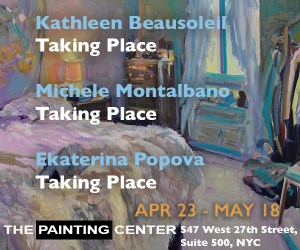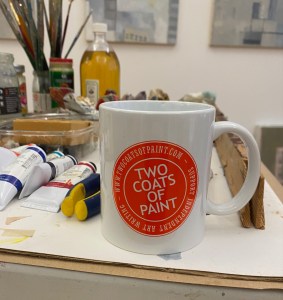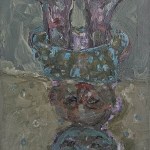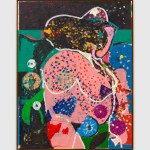
FOR THIS EDITION of the summer fiction column, my old friend�Rand Richards Cooper has contributed �Light,� a poignant story �published in Big as Life, his�1996 collection of short fiction.�In �Light��Cooper�imagines reconnecting with our old high school art teacher. –SB
——–
A note from the author
A story � from the writer�s point of view, in terms of its challenges and its meaning � tends to combine the personal and the formal. The personal matter of this story, for me, has to do with a high school teacher of mine who years later became ill and died, during the peak of the AIDS epidemic. I wanted to invent a plot that would bring to the surface certain underlying emotions that animated our friendship. In basic a way, then, the story is about unspokenness.
On the formal/structural side �Light� represents significant departures from my usual narrative m.o. One is the external and objective nature of the narrative — the two characters seen from the outside, with little access given to their thoughts. This requires a reader to proceed by a process of inference, and boosts the story�s pared-down, minimal quality. This was an inviting challenge for a writer who tends toward maximalism.
Part of what I recall about writing it was my desire to use a different method of quotation, with dashes instead of quotation marks. I�m no longer sure just who or what I�d been reading that inspired this — maybe Nadine Gordimer. I was interested in the slight difference of register that occurs in dialogue when you use dashes instead of quotation marks. Just a small shift in size, shape, emphasis and directness. I also liked the challenge of jumping right in to the story, via a conversation joined in media res, with a character�s rejoinder to a comment made just before the start. Doing that keyed for me the story�s method of leaving a lot unsaid.
Finally, the ending seems to me to have been distantly inspired by the closing lines of a couple of magnificent stories I cherished as a young reader and writer — John Cheever�s �Farewell, My Brother� and James Joyce�s �Araby.� Like those writers, I ended my story with a sudden shift into a slightly obscure lyricism; this was a way of departing from the story�s severe constraints, as if to draw on its latent emotional energy and end it with a small combustion of beauty, sadness and mystery.
Writers often encode their own approach in remarks characters themselves make about art. I wanted this story itself to be lighted, as the character says, from inside. Though I wrote �Light� a quarter-century ago, all these years later I still find the story intensely moving, and reading it I experience a resurgence of the joy and sorrow I felt when I wrote it.��–RRC
——–
�Light”
�IT SURE HAS, the younger man said, sitting down. Before knocking at the front door, he�d taken his sunglasses off, then changed his mind and kept them on. Now, in the dimness of the living room, he took them off again. �Too long.
The older man sat across from him in a rattan plantation chair. He was, according to calculations the younger man had made in the car on the way over, about fifty. He looked ten years older. ��Cup of coffee? he said in his pitted smoker�s voice.
�Sure. Thanks.
The younger man watched him walk across the room, in corduroys and a plaid flannel shirt, sleeves buttoned at the wrist. The old touches were still there: rhinestone-studded boots, a string tie; the sly eccentricities they�d all admired. His hair had thinned and turned grizzled. He moved deliberately, touching his fingertips to the tops of furniture.
Alone, the younger man reacquainted himself with the room�s exquisite objects. A chess table of glossy burled walnut. A Japanese dressing screen. The stained glass bay window, featuring a biblical scene he couldn�t place; he wondered what church had been razed to set it free. Beneath it stood ferns and a row of stone cats, crouched in various poses. As he watched, an actual cat emerged from them and stood staring at him.
The older man returned carrying coffee on a silver tray. Sitting, he stirred sugar into his coffee and placed the spoon carefully on a napkin. Your mother tells me you�re getting married next June, he said. �So who�s the lucky girl?
�You�ll like this. She’s someone I met in a sculpture class I was taking at art school last summer.
�Fellow artist, or the model?
�Well, fellow would-be artist.
Reaching down, the younger man petted the cat, which had approached and begun coiling around his ankles. �Hey, remember the time you got that model to pose for your drawing class, and you locked the door and covered the window with cardboard so none of us could see in?
The older man laughed. �Do I remember? Halpern called me in and practically read me my Miranda rights. Apparently, some of our mothers were terrified about their dear innocent daughters confronting the dread secrets of the male anatomy. Hah! But listen to me, I�m getting cranky in my dotage.
 The younger man finished his coffee and slid the cup onto the tray. �And what about Halpern? How�s he these days?
The younger man finished his coffee and slid the cup onto the tray. �And what about Halpern? How�s he these days?
�No contact. Can�t say I�m too terribly sorry, either.
�And Mrs. Goddard? She�s still there?
�Louise Goddard will be in that school the day the saints come marching in! She�s all right though. Did you know she actually took my painting class that last year? Came every single day too.
The younger man sat back. He could feel his nervousness sliding away. �Ah, Room 201, he said.
�That�s right. Room 201.
�We loved it up there. It wasn�t really like a class, you know? It wasn�t really like��school.?
�Funny, I seem to recall Halpern telling me that very same thing with deadening regularity.
�You know what I mean.
�Yes. I do know what you mean.
�You ever miss it? Ever wish you hadn�t left?
The older man gestured vaguely. �Well, it was the Eighties. We all thought we were going to make a bundle, right? Even artists! But tell me. To what do I owe the pleasure of your visit?
The younger man shifted in his chair. �Oh, you know. Making the rounds. Filling people in on the wedding.
They sat there. The younger man looked around. Along the far wall, jade trees were arranged in a dense green row. The place, he remembered, had always had a lush, jungle feel to it. He started to speak, then stopped and cleared his throat.
�My mother also said you hadn�t been feeling well.
The older man watched the cat slink to its favorite spot behind the ottoman. �That�s gotta be the understatement of the century, he said with a wan smile.
* * * *
Over a second round of coffee the younger man talked of his parents, now in their sixties. His mother passed whole mornings swapping gossip with a vast network of phone friends. His father had retired to the golf course.
�And what about you? the older man inquired. �How�s business out there in the heartland?
Business, in fact, was good. An industrial photographer, the younger man spent his days taking pictures of products for large corporations. The job was challenging, he explained, and more than paid the bills. �But I mean, it�s not exactly� well it�s not exactly art or anything.
�Art? The older man shrugged. �Hey, art is what you put into it. I�ve spent my life finding art in all sorts of places.
He waved his hand across the room, and the younger man followed the gesture, his gaze landing on a brilliantly painted effigy of a parrot. The house was packed with curious treasures. A dozen summers ago, just after high school, he�d spent a month housesitting here; and he remembered now the feeling, each time he had unlocked the front door, of stepping through some invisible wall into a different universe, one where beauty and imagination were the norm. Since then it had often pleased him to think about the house, lodged like a gem in this drab and run-down part of town. At one point in his life it had been the single most hopeful thing he�d known.
�It�s not bad, is it? the older man said in a quiet voice. �See, people think taste is something you�re born with. But they�re dead wrong, you know. Taste is hard work. I suspect you�ve learned that by now.
The younger man leaned intently forward. �You helped me learn it, he said. �You, and maybe three others.
The older man paused to blow his nose into a handkerchief. �Well, you were exceptional. You saw how light worked. How things are lit from�
�From inside! the younger man finished
�Exactly. From inside.
There was a silence. A smile came onto the younger man�s face. �You know, he said, I have something to confess to you. It�s a little awkward, but� Well, the truth is, I lost my virginity in this house.
�You did? With whom, pray tell?
Naming a former classmate, a girl he�d loved with a greedy desire, he nodded toward the bedroom. �My birthday. Night I turned eighteen.
�Well, what a� fine present! the older man said, chuckling.
�I guess I was a little weirded out at the time. You know, my teacher�s house and everything.
�Not at all. I�m glad I could be of some service in your, uh, moral education!
The two laughed, and the younger man shook his head, his face spreading in a sheepish grin. �I remember those hats you had on the wall. That collection. She and I, we actually took a few of them down and put them on. We sort of had a little private show.
The older man pursed his lips. A long moment passed. �Those hats were Edward�s, he said.
Released at last from its cage, the name hovered in the air around them. They sat listening to it flutter and hum.
�Edward was always the kitschier of the two of us.
The younger man made a soft noise in his throat. �I�m so sorry. I�m just so, so� sorry.
�Well, thank you.
�Are you�? Are you�? He couldn�t find a way to finish his sentence. �How do you feel?
�I feel pretty lousy, frankly. But you�ve got to play the hand you have, right?
The younger man attempted a smile. He could feel his careful grip slipping away. �If there�s anything I can do, Roger. Anything at all. I mean it.
Outside in the street a truck rumbled by, rattling the house. A ray of sunlight caught the older man�s face, and he closed his eyes and leaned into it.
�Well, there could be one thing, he said.
* * * *
Its curtains drawn, the living room basked in a warm twilight. �Do you mind if I put on some music? the older man said.
�No, I don�t mind, came the answer from behind the dressing screen.
He went to the stereo and pushed a button, and the dark, rising tones of G�recki�s Third Symphony poured into the room. Sitting again in the big plantation chair, he rested his arms along the armrests and closed his eyes. When he opened them, the younger man was standing before him, by the bay window. The older man looked. �You can cover yourself if you�re embarrassed, he said.
�I�m not embarrassed. I mean, I�m a little, but it�s okay.
 There was light to one side, spooling in through a gap in the curtains, and when the younger man shifted, it winked off his wrist. He had neglected to take off his watch.
There was light to one side, spooling in through a gap in the curtains, and when the younger man shifted, it winked off his wrist. He had neglected to take off his watch.
�This could be an ad for Timex, he joked.
�Oh no it couldn�t, the older man said. He laid his head back against the chair and closed his eyes.�Shoulder the sky, my lad, he recited softly. Shoulder the sky, and drink your ale.
At the door, the younger man found himself struggling for words, and the older man, for the moment a teacher again, helped. He asked how preparations for the wedding were going. �Where is the wedding, by the way?
�Louisiana. Outside Baton Rouge.
�Good Lord, a Southern belle!
They shook hands. The older man stood in the doorway, the younger a step below, and when their handshake opened into an embrace, the difference made it clumsy. Pulling back, the younger man tried not to sigh. He had to find a way to leave that would let him leave.
�Hey! He brightened. �Remember that tie you gave me?
The old man looked puzzled. �Which tie?
�For my graduation. The red, white, and blue one.
�No, I can�t say that I do.
�Sure you do! You know, the Bicentennial tie! With the Liberty Bell and AMERICA all over the front�
�Uh-oh, the older man said. �Wasn�t there something on the back of that tie?
�Yes! said the younger man. On the back of the necktie, the words IS A LITTLE CRACKED had appeared in bold block letters.
The older man rolled his eyes. �And that�s what I gave a callow youth for his high school graduation? Now, what kind of educator does a thing like that?
�A damn good one, the younger man said. �I still love that tie.
The older man smiled. �Well then, wear it well, dear boy. In health and good humor.
He touched the younger man�s shoulder; and with that he backed into the house, shutting the door behind him.
The younger man came down the steps, placing his foot with care on each one. He thought of his many friends, the old and the new; of his brother and sisters, scattered across the country and only half in touch; of the woman he was set to marry in ten months and the life that lay before them, waiting to be filled with the children they would have, the places they would see, the work they would do. He felt himself a grateful messenger employed in vast purposes; an emissary to princes in an unseen land. ###
��
About the author:�Rand Richards Cooper is the author of two works of fiction,�The Last to Go�and�Big As Life. He has been Writer in Residence at Amherst and Emerson colleges, and his fiction has appeared in Harper�s, GQ, Esquire, The Atlantic and many other magazines, and in Best American Short Stories. Rand lives in Connecticut,�where�he writes a column, “In Our Midst,” for Hartford Magazine,�and is Contributing Editor at Commonweal Magazine.
Illustrations by Phoebe Funderburg-Moore.
��
Related posts:
Email: Daniel Wiener on art in fiction
Fiction: Consummate Saturday [Paul D�Agostino]
Fiction: The Teddy Bears [Laurie Fendrich]
Fiction: The Unknown Masterpiece [Honore De Balzac]

















great story. very touching!
This was very poignant for me. Beautifully written. Needless to say, it brought back so many memories. Sharon your work is beyond amazing and Randy’s talent is tremendous. I look forward to following you both.